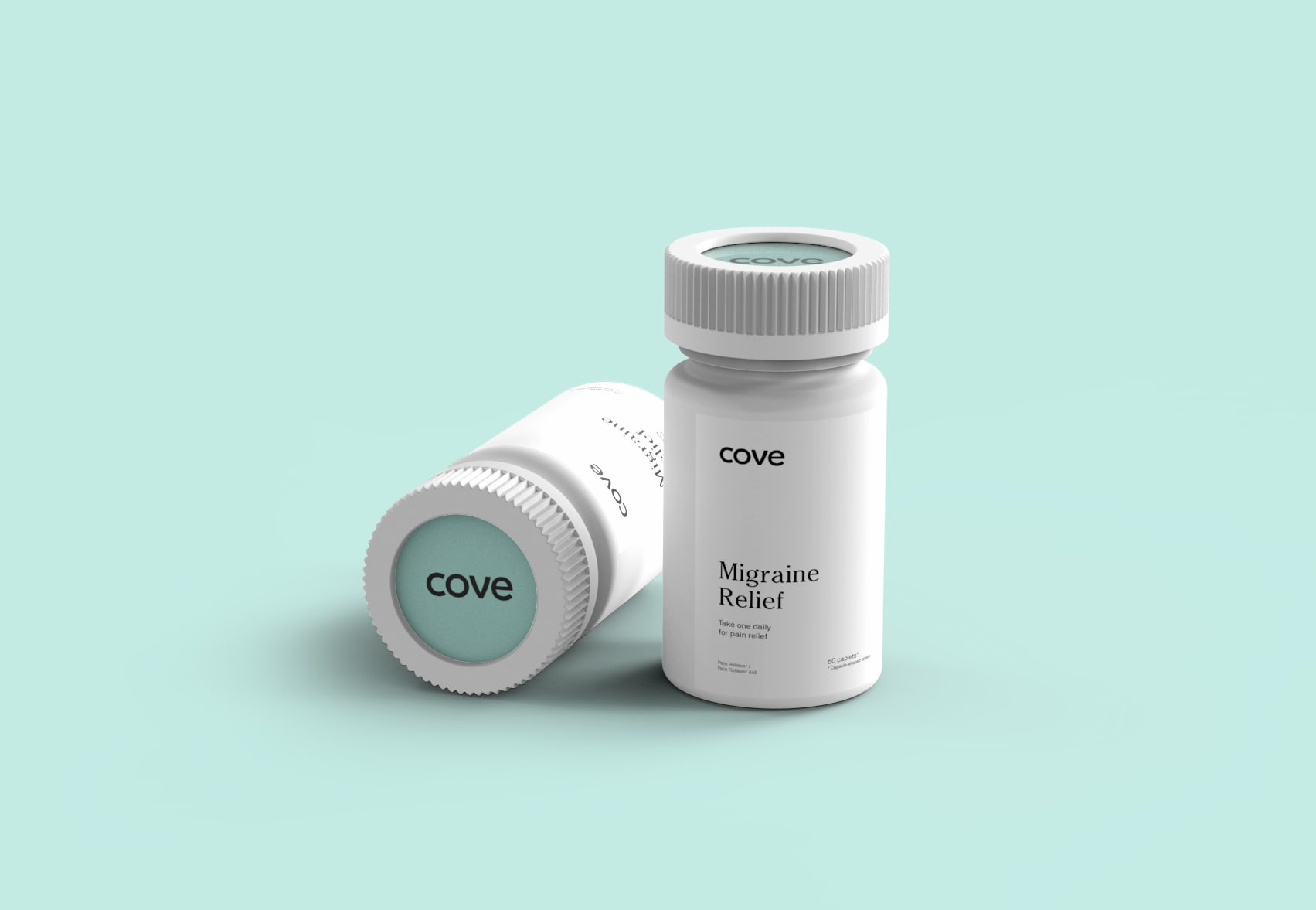For many chronic migraine sufferers, Botox® injections have become a reliable preventive method to reduce the frequency of their migraine headaches. Unfortunately, many doctor offices are closed right now due to COVID-19 complications, making it difficult for people who need Botox® injections to get relief.
Even if you can’t physically see a doctor right now though, telehealth options (like Cove) make it possible to consult with medical professionals about your other options.
When working with your doctor to decide what to try next, leading migraine expert and Cove Medical Director Dr. Sara Crystal says, “The CGRP antagonists—Aimovig®, Ajovy®, and Emgality®—would be good options for patients who cannot receive Botox® now due to COVID-19.”
Why is this a good place to start? Dr. Crystal explains that “Botox® works through several mechanisms, some known and some not fully understood. It modulates neurotransmitter release and blocks certain proteins involved in pain transmission. One of these is CGRP, calcitonin gene related peptide, which is very important in the migraine pathway.”
She goes on to make an important note though: “Some insurers won't cover Botox® and the anti-CGRPs at the same time, and this may be a consideration for those who are able to resume Botox® in the near future.”
So, what are your other options, in addition to anti-CGRP treatments? We’ve compiled a variety of alternative options that could reduce the frequency of your attacks, even if they’re not quite as effective as Botox® is for you.
While it takes time to find new preventive methods that work for you—an average of three months for many people—all hope isn’t lost.
Prescription treatments
There are quite a few prescription treatment options available for migraine sufferers who are looking to reduce the frequency of their attacks. While many people who try Botox® have already tried a few of the below options, we thought it was important to list every option.
Anti-CGRPs
Let’s start with the option Dr. Crystal recommends thinking about: anti-CGRP medications. They’re the latest development in migraine treatment and prevention. As mentioned above, CGRP, or calcitonin gene-related peptide, is a pain-related protein that affects the size of blood vessels in your brain. CGRP levels spike during an attack, so anti-CGRP medications work directly against this spike to regulate CGRP levels.
This reduces the frequency of attacks, shortens their duration, and alleviates pain and other symptoms. Preventive anti-CGRP medications, currently available via an at-home injection, are FDA-approved to treat episodic and chronic migraine, and are proven effective for migraine with aura or without it. While not preventive, Dr. Crystal also notes that short-acting anti-CGRPs like Nurtec™ and Ubrelvy®, could be good options for acute treatment.
Promising studies show that anti-CGRP medication may work for individuals who have tried other preventive migraine treatments without success—often with fewer side effects than many existing medications.
Anticonvulsants
Though anticonvulsants are commonly prescribed to treat epilepsy, they also help prevent migraine attacks. In fact, a study showed that successful anticonvulsanttreatment can reduce frequency by 50%.
Antidepressants
Similar to anticonvulsants, antidepressants are primarily used to treat a different condition (depression). But research shows that certain antidepressants can be an effective long-term solution for migraine prevention.
The most common category of antidepressants used for migraine prevention are tricyclic antidepressants. They work by helping individuals maintain a healthy serotonin level, which can plummet during an attack.
Beta blockers
Typically used to control blood pressure or manage abnormal heart rhythms, beta blockers are also a proven preventive migraine treatment. They help to relax the blood vessels in your brain, which dilate during a migraine attack. And by relaxing the blood vessels in your brain, beta blocks allow blood to flow normally again.
Supplements
There’s no magic pill that’ll cure your migraine, but taking certain supplements—a catch-all term for products like vitamins, minerals, probiotics, and herbal foods—can help provide support for migraine sufferers.
Sometimes, a vitamin deficiency could be triggering your migraine attacks or increasing their intensity, so adding a supplement to your daily routine can help. (Of course, that means you have to first identify the deficiency, which may require the help of your doctor.)
Below, we’ve outlined some of the most effective supplements you can try.
Magnesium
Experts believe magnesium—a mineral that helps your body regulate muscle and nerve function, among other things—could help prevent cortical spreading depression, or the wave of brain signaling thought to cause migraine attacks. Magnesium could also block pain-transmitting chemicals in the brain, reducing pain during an attack.
Research suggests magnesium can be especially helpful for people who have migraine with aura or menstrual migraine.
CoQ10
Strong scientific research suggests that coenzyme Q10, or CoQ10, can help reduce the frequency of migraine headaches. CoQ10 can help lower CGRP levels that spike during an attack, which can reduce migraine frequency. In fact, one study found that most participants’ headache days decreased by more than 50% after taking CoQ10.
It’s difficult to get enough CoQ10 through dietary sources, so taking a supplement is recommended if this is the nutrient you need.
Riboflavin
Riboflavin is a natural remedy, and studies have shown that it can help reduce the number of attacks you experience each month. Research on the vitamin’s effect on migraine is limited, but evidence shows that at a high dose (400mg), it’s a safe and well-tolerated migraine prevention alternative.
Riboflavin is present in eggs, green vegetables, lean meats, and dairy products, but to consume enough to prevent migraine attacks, you’ll likely need a supplement.
Lifestyle changes
We know, easier said than done. And we also know you’ve likely already made several lifestyle changes to keep your migraine attacks as few and far between as possible. But as you attempt new types of treatment, it’s more important than ever to stay healthy and balanced. So just take these as gentle reminders to practice self-care.
De-stress (as much as you can)
Managing stress, especially now, can be incredibly difficult. But since stress can trigger migraine attacks, it’s important to figure out how to relax. Some of the best ways to relieve everyday tension include exercising regularly and spending time outside as much as you’re able to.
Try yoga, meditation, or relaxation exercises such as deep breathing, or treat yourself to creative hobbies projects that can channel your energy into something more helpful than stress.
You might also want to keep a stress journal to help find patterns and avoid unnecessary triggers. For example, watching the news or spending too much time on social media right now might cause anxiety, and a stress journal can help you identify the need to limit your screen time.
Get enough sleep
Sleep deprivation is both a migraine trigger and a stress trigger, so it’s important to get enough sleep. Do your best to establish a pattern of going to bed and waking up at the same time every day. (And for more tips on getting better sleep, see our top sleep tips here.)
Avoid triggers
As you know, doctors aren’t 100% sure what causes migraine, so it’s important to know your migraine triggers (sounds, lights, certain foods, stress, and more). Even wearing your CDC-recommended face mask could be a potential trigger. You likely already know some of your triggers, but tracking your migraine can help you learn exactly what may cause symptoms, so you can avoid them.
We know it can be frustrating when you finally find a treatment that works for you, only to have it taken away—but you still have options even if you no longer have access to Botox® injections for migraine prevention.
The best way to start is by talking to your doctor about what you should try next and working together to determine the right timeline for finding the next best treatment plan.
The content provided in this article does not represent the views and opinions of the manufacturers of products mentioned. The information provided in this article is not a substitute for professional medical advice, diagnosis, or treatment. You should not rely upon the content provided in this article for specific medical advice. If you have any questions or concerns, please talk to your doctor.
These statements have not been evaluated by the FDA. The supplements referenced are not intended to diagnose, treat, cure, or prevent any disease.
Nurtec ODT (rimegepant) orally disintegrating tablets is a prescription medicine for the acute treatment of migraine attacks with or without aura in adults. Nurtec ODT is not used as a preventive treatment of migraine. It is not known if Nurtec ODT is safe and effective in children. Do not take Nurtec ODT if you are allergic to Nurtec ODT (rimegepant) or any of its ingredients. Before you take Nurtec ODT, tell your healthcare provider (HCP) about all your medical conditions, including if you: are pregnant or plan to become pregnant; breastfeeding or plan to breastfeed. Tell your HCP about all the medicines you take. Nurtec ODT may cause serious side effects including allergic reactions, including trouble breathing and rash. Call your HCP or get emergency help right away if you have swelling of the face, mouth, tongue, or throat or trouble breathing.Visit www.fda.gov/medwatch or call 1‑800‑FDA‑1088 or report side effects to Biohaven at 1‑833‑4Nurtec. Please click here for full Prescribing Information and Patient Information.


